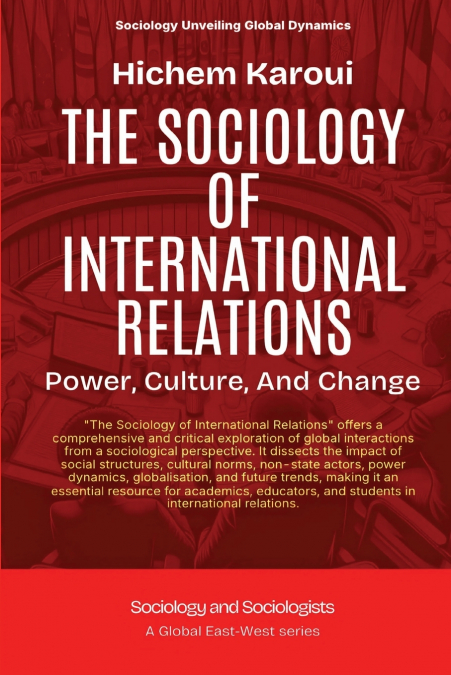
 Librería Desdémona
Librería Desdémona
 Librería Samer Atenea
Librería Samer Atenea
 Librería Aciertas (Toledo)
Librería Aciertas (Toledo)
 Kálamo Books
Kálamo Books
 Librería Perelló (Valencia)
Librería Perelló (Valencia)
 Librería Elías (Asturias)
Librería Elías (Asturias)
 Donde los libros
Donde los libros
 Librería Kolima (Madrid)
Librería Kolima (Madrid)
 Librería Proteo (Málaga)
Librería Proteo (Málaga)
Understanding Global Dynamics: A Sociological Perspective on International RelationsThis book offers a fresh lens for understanding the complexities of global interactions. It departs from traditional state-centric approaches and examines the sociological aspects of international relations. This shift in perspective enlightens us on how social structures, cultural norms, and identities fundamentally shape the global political landscape while highlighting non-state actors’ crucial roles.At its core, the work examines how international norms, values, and identities are socially constructed and impact global affairs. Constructivism serves as a key theoretical framework, demonstrating how shared beliefs and collective identities influence state behaviour, policy-making, and the development of international institutions. The book reveals the dynamic nature of global politics by analysing how cultural norms and social identities are negotiated within international contexts.The text significantly broadens traditional perspectives by examining how multinational corporations, NGOs, and transnational advocacy networks contribute to global governance. These non-state actors interact with governments and shape international norms, often driving progress in human rights, environmental protection, and global health.Power dynamics and inequality form another critical dimension of analysis. The book examines how social hierarchies based on class, gender, race, and ethnicity perpetuate disparities in power and resources across the global system. Through critical theory, it interrogates these inequalities and explores pathways toward more equitable international relations.The intersection of globalisation and international politics receives thorough attention in this book. It analyses how the increased movement of goods, people, and ideas across borders creates both opportunities and challenges. The impact of these processes on cultural identities and social relations provides readers with a comprehensive understanding of the forces driving global change, making them feel well-informed about the current global dynamics.Looking forward, the book explores emerging trends in global politics. It delves into the influence of new social movements, technological advancements, and shifting power dynamics. This forward-looking perspective equips readers with tools to anticipate and navigate the evolving nature of international relations in our increasingly interconnected world, making them feel prepared for the future.